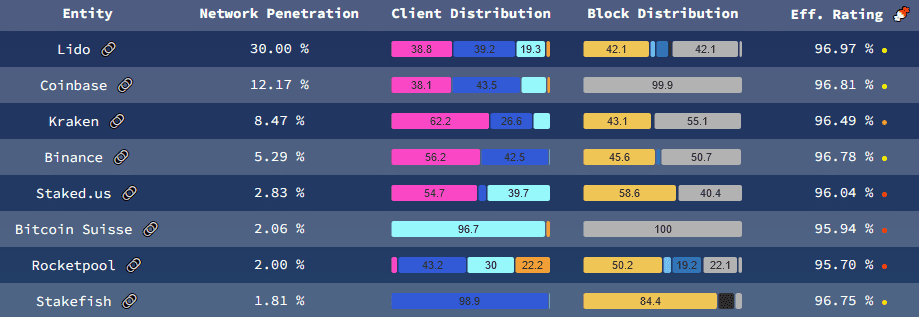The Ethereum liquid staking provider Lido has been criticized again and again. Most recently, for controlling around 30 percent of all Ethereum staking validators.
Now Lido has to justify himself to the Ethereum community again. Especially from those who advocate maximum decentralization of the smart contract platform.
The reason for this is a statement that Vasiliy Shapovalov made on the Devcon Bogota in Colombia has met. The Lido co-founder claims:
Most Ethereum staking validators should be run by professional stakers and not hobbyist stakers.
Vasiliy Shapovalov, co-founder of Lido
Especially ETH stakers, who have their own validators, and some well-known Ethereum influencers then sharply criticized Shapovalov. They accuse himthat his statement goes against Ethereum’s original ethos of decentralization.
Ben Edgington, a well-known Ether developer at ConsenSys, explained for example, that Lido poses a threat to Ethereum’s decentralization if the liquid staking provider becomes too powerful. But what is the real problem with this debate?
read too

The Ethereum Staking Dilemma
To have your own ETH-Staking Validator requires staking 32 ethers, currently valued at around $41,000. In addition, each staking validator must be online 24/7 and running specific staking software on a computer in order to participate in the transaction validation process. In return, validators receive staking rewards in ETH. Currently, this allows an annual return of achieve about 5 percent on ether.
This circumstance has created a market for projects such as Lido and other staking providers that also allow retail investors to participate in staking with any amount of Ethereum.
Because Lido and other staking providers bundle their users’ deposits into 32 ETH blocks and hand them over to a large number of professional staking providers who provide the hardware for the staking validators and manage them. In return, these companies get a share of the revenue generated by the staking.
read too

Are the investors the problem?
The problem is that many retail investors blindly trust staking providers who do not primarily have Ethereum’s decentralization in mind, but their own profit.
The big challenge for the Ethereum community therefore seems to be to conduct education so that individual staking providers do not become too powerful.
Do you want to buy cryptocurrencies?
Trade the most popular cryptocurrencies like Bitcoin and Ethereum as an ETP on Scalable Capital, the leading investment platform in Europe.
